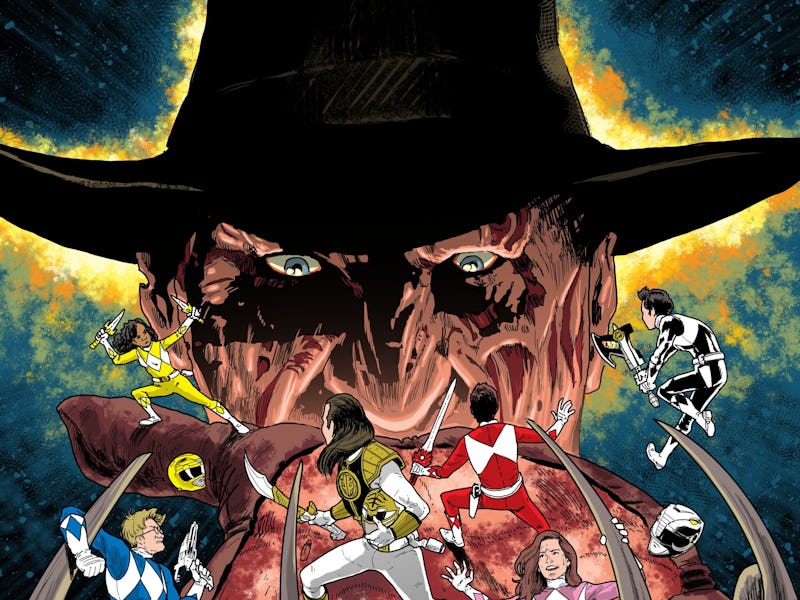Power Rangers vs. Freddy Krueger is the best Elm Street story in decades
Stephen Harber's Power Rangers: A Nightmare on Elm Street reveals the limitations of nostalgia.

The weirdest thing about the Power Rangers fighting Freddy Krueger is how well it works.
"He represents everything they're not," indie comics creator Stephen Harber tells Inverse. "There's a bit of Freddy in most villains in Power Rangers. And Freddy's specialty is teenagers. It just seems like peanut butter and chocolate."
In a quiet corner on the internet, Stephen Harber, a copywriter and freelance film and TV critic, is exercising his creative voice in Power Rangers: A Nightmare on Elm Street, a fan-made comic book with artists Francisco Mauriz, James Zark, and Ryan Lindberg.
True to its title, the series pits the teen heroes of the '90s TV phenomenon Mighty Morphin Power Rangers against Wes Craven's greatest film creation, Freddy Krueger, brought to life onscreen by Robert Englund. In its three issues currently online (Harber plans to make ten in total), the story goes hard into deep-cut Power Rangers mythology — the crossover takes place between Seasons 2 and 3 of the classic show — and ropes in other slasher icons like Jason Voorhees and Hellraiser.
Cover of 'Power Rangers: A Nightmare on Elm Street' #1.
Power Rangers: A Nightmare on Elm Street is an independent project. It does not have the involvement of Hasbro (current owners of the Power Rangers franchise) or WarnerMedia, whose subsidiary New Line Cinema was a box office monster in the '80s and '90s with the original A Nightmare on Elm Street films.
More than just fan fiction and a portfolio piece for the artists, the project exists as a statement about what it actually means to age-up a nostalgia franchise. Harber is a fan of both Power Rangers and Freddy Krueger, but it was Power Rangers that Harber wanted to grill as an artist.
"I feel like the legacy brand of Power Rangers—there's a way to make that content speak to the older audience of the fan base without trying to keep the younger audiences in perspective all the time," Harber says. "And there's a way to it that's not just grimdark. I'm really aware of writing the [Power Rangers] characters as the show would, and not have them do adult material or use foul language. That's all relegated to Freddy Krueger. That's the juxtaposition. It's showing maturity without changing the tone of the show."
A child of the '90s, Harber watched Power Rangers while growing up in Nevada, when it was a ratings juggernaut for Fox Kids. He's been a huge fan since. As a teenager, he made visits to Blockbuster, where he and a friend picked up horror movies. One of his favorites was 1987's A Nightmare on Elm Street 3: Dream Warriors, itself a Power Rangers-esque story about teenagers who use their dream powers to take on Freddy Krueger.
"That's part of the Nightmare franchise that's not capitalized on," Harber says. "I love the Dream Warriors and I wanted to give them more exposure." (Minor spoilers: the Dream Warriors play a huge role in Issue 2.)
Interior page of 'Power Rangers: A Nightmare on Elm Street' #1.
An aspiring comic book professional, Harber mashed up the two when he was feeling down after a financially successful but creatively unfulfilling Kickstarter project in 2015. One day, his mood got him thinking about a sinister foil for his childhood heroes. He quickly arrived at Freddy Krueger. He found unusual tonal syncing between the Power Rangers, who karate kick monsters in dinosaur costumes, and Freddy Krueger, the funniest and darkest slasher of all horror cinema.
"His history is dark," says Harber. "That's not explored in the [Nightmare on Elm Street] media. To everybody, he's just a funny mascot, and I wanted to play with that. He represented something dark Power Rangers never wanted to touch with a hundred-foot pole."
Adds Harber, "He represents childhood trauma. The Power Rangers are angels, they're about protecting. That's why he's a good villain for them. He is on their level."
As a fanfiction comic, Harber knows there's a ceiling to hit. He can't make money off the project, which still takes up time and energy; he classifies Power Rangers: A Nightmare on Elm Street as a parody, which he hopes keeps him safe from lawyers. "If you want to get microscopic, it satirizes both," he maintains. In Issue 1, Freddy fights the Power Rangers using his "Power Ass," which makes for a good legal defense.
Until Harber hears the knocking of intellectual property law at his door, he's just thankful the comic looks good. "There's fan fiction I read that's good, but up to a point. That's the thing about the art. Francisco does such a good job making the characters look like they do on the show. I just try to raise the bar."
On the surface, Power Rangers: A Nightmare on Elm Street is a celebration of both nostalgic elements it spoofs. But deep in its digital pages is a bigger ambition with more to do with pushing the limitations of nostalgia — and finding the possibilities within those boundaries.
"We've through a decade of revivals like The X-Files where it didn't go like they expected," Harber says. "I think that's what happened with the 2017 Power Rangers movie and I think that's where Power Rangers is at. This is putting two nostalgic things together, creating something new that sort of craps on them both. It's not disrespectful, but it is tongue-in-cheek. It's not saying you can't go home again, but if you do, it looks a bit different."
Adds Harber, "Nostalgia is a huge part I don't think we'll outgrow. It gets stronger as time goes on."
Variant cover of 'Power Rangers: A Nightmare on Elm Street' #1 that pays homage to the original poster for 1984's 'A Nightmare on Elm Street.'